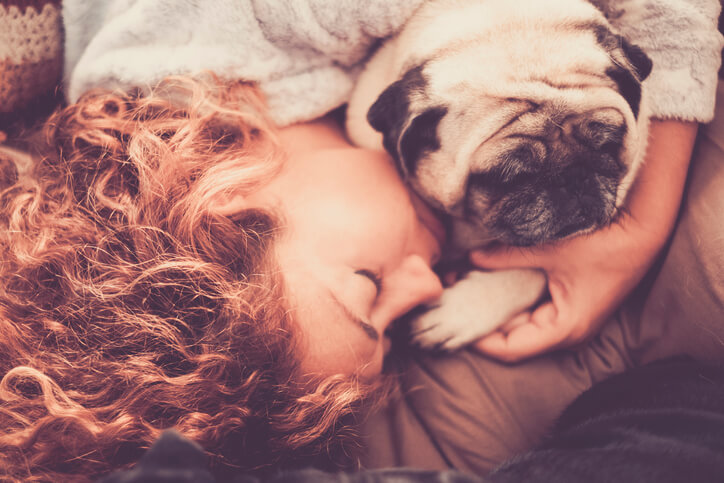Ladies: For a Good Night’s Sleep, You Should Maybe Sleep With Your Dog
7 years ago | Sleep
By Joy Stephenson-Laws, JD, Founder
Women need more sleep than men. We apparently need about 30 more minutes.
And there is credible research to suggest that the reason we need more sleep is because we usually multi-task and use more of our “actual brain than men leading to a greater need for sleep. Essentially, the more you use your brain during the day, the more it needs to rest while asleep,” reports the National Sleep Foundation.
Now, to be clear to all the men out there, this in no way suggests that women are smarter than men. But it appears that as women, we tend to take on more multi-tasking activities than men, including taking on more responsibilities at home.
There are also additional factors that may be contributing to sleep deprivation in women.
There are studies which suggest that “during times of hormonal change—such as puberty, pregnancy and menopause—women are at an increased risk for sleep disorders such as obstructive sleep apnea, restless legs syndrome and insomnia. Women also tend to report that they have more trouble sleeping before and during their menstrual periods,” (Scientific American).
So it appears that at various times during a woman’s pre-adult and adult life, she may experience sleep issues.
Despite the need for more sleep, it appears most women are not getting enough. Reportedly, about 63 percent of women compared to 54 percent of men are not getting sufficient sleep.
(Male or female, adults should aim to get 7-9 hours of sleep per night).
“Sleep is essential for survival, health, and productivity and takes up more time than any other single activity, so understanding inequality in time for sleep is important,” reports the National Institutes of Health (NIH).
Moreover, “Scientists say women suffer more than men, both mentally and physically, if they are forced to skimp on their sleep,” according to one source.
“As well as a higher risk of heart disease, depression and psychological problems, sleep-deprived women have extra clotting factors in their blood, which can lead to a stroke.
They also have higher inflammation markers, which indicate developing health problems.”
So ladies, the bottom line is we need to get more sleep! Getting sufficient sleep is just as important as eating nutrient-rich foods (fruits and vegetables), getting regular exercise and managing stress.
Although bedtime rituals (taking a hot bath, misting your pillow with a lavender spray, journaling) may be great ways to fall asleep quicker and have a more restful night, a recent study suggests that women sleep better with dogs, instead of human partners, by their sides.
Researchers looked at survey data from 962 adult women living in the United States.
- 55 percent shared their bed with at least one dog.
- 31 percent shared their bed with at least one cat.
- 57 percent shared their bed with a human partner.
This is what researchers found:
“Dog owners had earlier bedtimes and wake times than individuals who had cats but no dogs. Compared with human bed partners, dogs who slept in the owner’s bed were perceived to disturb sleep less and were associated with stronger feelings of comfort and security,” according to the study report.
“Conversely, cats who slept in their owner’s bed were reported to be equally as disruptive as human partners, and were associated with weaker feelings of comfort and security than both human and dog bed partners.”
So my takeaway from all this is that for women, a dog may not only be a better sleeping partner than a cat but also her husband! We obviously cannot kick our spouses or partners to the sofa every night, and some people may be allergic to dogs or not care to own one.
But it’s interesting to see how the relationships with our pets can have a positive impact on our overall health and wellness, including sleep. The good news is whether you are a dog owner or not, male or female, there are many proactive steps you can take to help ensure you get enough quality sleep.
Diet and nutrition can play a big role in getting a restful night of sleep.
“Food relates directly to serotonin, a key hormone that — along with Vitamin B6, B12, and folic acid — helps promote healthy sleep. Try to consume foods that calm the body, increase serotonin levels and get you ready for restful sleep,” according to the Cleveland Clinic.
Some of these foods include complex carbohydrates such as whole grains, lean protein like fish and healthy fats including avocado. Also limit alcohol consumption before bedtime.
For other tips on how you can get a good night’s rest, including eating additional specific foods, read here.
In the meantime, take the time to figure out how you can get your best sleep.
Enjoy your healthy life!
The pH professional health care team includes recognized experts from a variety of health care and related disciplines, including physicians, attorneys, nutritionists, nurses and certified fitness instructors. This team also includes the members of the pH Medical Advisory Board, which constantly monitors all pH programs, products and services. To learn more about the pH Medical Advisory Board, click here.







